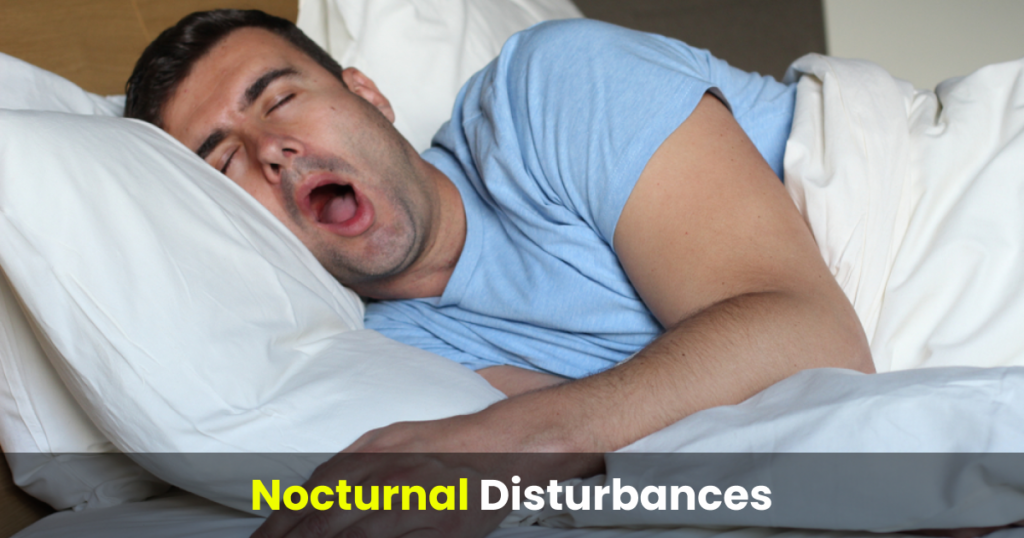Sleep-related eating disorder (SRED), also known as insomnia, is characterized by irregular and timeless eating habits at night. Eating while asleep, frequently with no awareness or memory of the episode upon waking, is defined as a sleep disorder. Now let’s examine its causes, signs, and available treatments.
Causes
1. Sleep Disorders
 Sleep-related eating disorders, also known as SREDs, often coexist with other sleep disorders like obstructive sleep apnea, restless legs syndrome, and sleepwalking.
Sleep-related eating disorders, also known as SREDs, often coexist with other sleep disorders like obstructive sleep apnea, restless legs syndrome, and sleepwalking.
2: Genetic Predisposition

Given that SRED (sleep-related eating disorder) typically runs in families, there might be a genetic component involved.
3. Stress and Anxiety

In exposed people, emotional strain or anxiety may set off sleep-related eating disorder (SRED) episodes.
4- Medications

Certain medications, especially those associated with eating or sleeping cycles, may increase the risk of SRED.
Symptoms
1. Night-time Eating

While sleeping during episodes, you frequently consume food in strange forms or combinations.
2. Partial or No Recall

People usually wake up and either forget or vaguely remember their eating episodes.
3. Nocturnal Disturbances

Episodes upsetting regular sleep routines cause stiffness, tiredness, or weariness during the day.
4. Rapid Eating or Messy Eating Habits

The hurried and disorganized nature of food consumption distinguishes it from regular waking eating habits.
Treatment Options
1. Medical Evaluation
It is essential to see a sleep specialist or other healthcare professional in order to identify sleep-related eating disorders (SRED) and rule out any other underlying medical issues. This process consists of
- Initial Assessment
- Physical Examination
- Sleep Assessment
- Laboratory Tests
- Sleep Study (Polysomnography)
- Psychological Evaluation
- Discussion of Findings
- Follow-Up.
This method assists in correctly identifying (SRED) sleep-related eating disorders and creating a successful treatment plan customized to meet your individual requirements.
2. Identifying Triggers
We can manage sleep-related eating disorders (SRED) by recognizing and reacting to triggers such as stress, anxiety, or specific drugs. This technique is essential in a number of situations, including
- Awareness and Observation
- Keeping a Journal
- Therapeutic Assessment
- Stress Testing
- Collaborative Exploration
- Behavioral Analysis
- Self-Reflection
This procedure is essential for lowering troublesome behaviors, strengthening emotional control, and boosting general wellbeing.
3-Sleep Hygiene
Reducing episodes may be possible by enhancing sleep hygiene measures, such as keeping a regular sleep schedule and setting up a comfortable sleeping environment. To achieve this, one should implement these measures.
- Regular Sleep Schedule,
- Create a Relaxing Bedtime Routine
- Optimize Sleep Environment
- Limit Stimulants and Alcohol
- Manage Light Exposure
- Physical Activity
- Watch What You Eat and Drink
- Create a Comfortable Sleep Environment
- Manage Stress
- Limit Daytime Naps
Seeking advice and additional assessment from a healthcare professional could be beneficial.
4- Medications
You may administer some drugs (such as antidepressants or anticonvulsants) under medical supervision to reduce nightly awakenings or behaviors. Have a look at some options.
- Hypnotics (Sedative-Hypnotics)
- Melatonin Agonists
- Antidepressants
- Antihistamines
- Benzodiazepines
- Orexin Receptor Antagonists
- Behavioral Therapy
- Antipsychotics
The best way to manage sleep issues is usually to mix medicine with behavioral and lifestyle changes.
5. Nutritional Counseling
Working with a nutritionist or dietitian can facilitate the establishment of appropriate eating practices and the management of any weight issues related to SRED sleeping-related eating disorders. The following can help a bit.
- Improved Health Outcomes
- Weight Management
- Enhanced Sports Performance
- Behavioral Changes
- Personalized Approach
In order to promote overall health and wellness goals, nutritional counseling is especially helpful when combined with other facets of healthcare, such as medical treatment plans, suggestions for physical exercise, and behavioral therapy.
Conclusion
The complicated problem known as sleep-related eating disorder can have a serious negative effect on a person’s general health and quality of life. The management and alleviation of symptoms associated with SRED necessitate an early diagnosis and customized treatment plans. Seeking expert assistance from medical professionals with experience treating sleep disturbances is critical for efficient symptom management and gradual symptom recovery.

